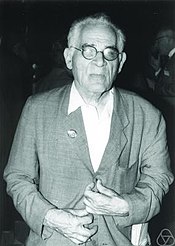L. J. Mordell
| Louis Mordell | |
|---|---|

Louis Mordell in Nizza, 1970.
|
|
| Born |
Louis Joel Mordell 28 January 1888 Philadelphia, Pennsylvania |
| Died | 12 March 1972 (aged 84) |
| Nationality | British |
| Alma mater | St John's College, Cambridge |
| Known for |
Chowla–Mordell theorem Mordell–Weil theorem Erdős–Mordell inequality |
| Spouse(s) | Mabel Elizabeth Cambridge |
| Children | Kathleen, Donald |
| Awards |
Smith's Prize (1912) De Morgan Medal (1941) Senior Berwick Prize (1946) Sylvester Medal (1949) Fellow of the Royal Society |
| Scientific career | |
| Fields | Mathematics |
| Institutions |
Birkbeck College University of Manchester University of Cambridge |
| Doctoral advisor | Henry Frederick Baker |
| Doctoral students |
Ram Prakash Bambah Eric Barnes J. W. S. Cassels John Chalk Clive Davis |
Louis Joel Mordell (28 January 1888 – 12 March 1972) was an American-born British mathematician, known for pioneering research in number theory. He was born in Philadelphia, United States, in a Jewish family of Lithuanian extraction.
Mordell was educated at the University of Cambridge where he completed the Cambridge Mathematical Tripos as a student of St John's College, Cambridge starting in 1906 after successfully passing the scholarship examination.
After graduating Mordell began independent research into particular diophantine equations: the question of integer points on the cubic curve, and special case of what is now called a Thue equation, the Mordell equation
He took an appointment at Birkbeck College, London in 1913. During World War I he was involved in war work, but also produced one of his major results, proving in 1917 the multiplicative property of Ramanujan's tau-function. The proof was by means, in effect, of the Hecke operators, which had not yet been named after Erich Hecke; it was, in retrospect, one of the major advances in modular form theory, beyond its status as an odd corner of the theory of special functions.
In 1920, he took a teaching position in UMIST, becoming the Fielden Chair of Pure Mathematics at the University of Manchester in 1922 and Professor in 1923. There he developed a third area of interest within number theory, geometry of numbers. His basic work on Mordell's theorem is from 1921 to 1922, as is the formulation of the Mordell conjecture.
...
Wikipedia
